|
VISIT OUR MASSES and HOMILIES ONLINE! CLICK BELOW TO WATCH
St. Elizabeth of Ravenna Catholic Church
*** ANNOUNCING: NEW BOOK RELEASE FEBRUARY 2022 ***
Ethnic Atlas of the United States: National Maps 1980 - 2020

This ethnic atlas from Earthhealing, Inc. and published by Brassica Books, has been a work in process for over 40 years, perhaps longer than most research projects -- and involving the same three people over that multi-decade period. This book contains five specifically colored national maps from 1980 - 2020, showing ethnic pluralities of every U.S. County (3,126) using racial and ancestral data drawn from the last five federal decennial Censuses. Textual highlights are included about each state and major ethnic groups represented.
Obtaining a static overall view at one time has some merit, but a more challenging puzzle is to describe the changing face of ethnic America over time, a truly social, ecological, cultural and environmental issue worth pursuing. We strive to record how variation in 80 racial and ethnic groups have changed in all U.S. geographic areas over this recent half century period. When comparing the entire map series, one discovers the distinct flavor of America's major ethnic groups; remember that behind the scenes a wide variety of minor groups exist and even thrive. An environment in which diversity is both recorded and celebrated is an enriching one and is worth celebrating.
Observing ethnic shifting is itself dramatic and can be partly realized by comparing the five general ethnic/racial maps that have been standardized to contain the same color codes and groupings. Increasing mobility of the American public complicates the ethnic picture; it tends to erode certain concentrations of ethnic groups and causes a greater intermixing of new communities.
We are all ethnics to some degree; it is just that other issues in life often erase this focus. In the deep-down heart of things, most people would like to uncover more about their own roots and share them with others. Many agree that cultural differences, when celebrated and respected, add to the rich totality of the American experience. For this reason, we encourage the people who take pride in their ethnic backgrounds to celebrate and enjoy their togetherness when gathered at given opportunities. In many cases, this sharing extends to outsiders who venture into such gatherings and are welcome. Thus, we hope that this continued cultural consciousness will help in the global collaboration needed to save our wounded earth.
Digital eBook available at Amazon.com
Earthhealing Team – Al Fritsch, Janet Kalisz, Mark Spencer
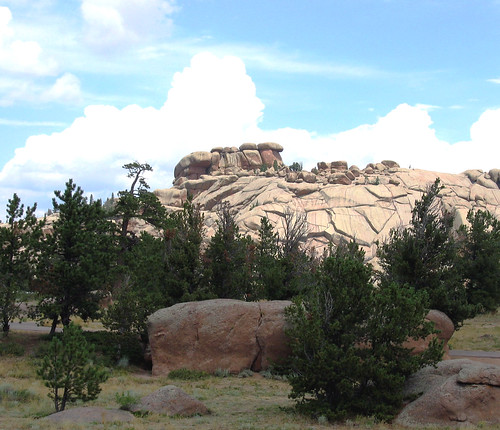
Vedauvoo formation, Wyoming.
(*photo credit)
March 1, 2022 Championing a Wind-Energized Economy
During 2021, renewable energy agencies show that about 21 GW (gigawatts) of windpower came on line, an enormous addition of one type of renewable energy. Interestingly enough, the nearest competitor in energy sourcing is now solar energy, thus indicating that the renewables are rapidly gaining the spotlight in the race to make the economy carbon-free (no fossil fuels) by mid-century. Still, we are fully aware that critical energy needs will expand with a growing global population and increasing quality of life for all people. Other renewable sources such a hydro, geothermal and tidal are destined in time to play a major role. We are now aware that no single technology is a permanent solution.
Renewables are coming rapidly, but will they get here fast enough to stave off catastrophic climate-change effects? Actually, wind as an energy source is one key to avoid runaway climate change. The advances in wind power are truly spectacular, but so are solar's; furthermore, geothermal is a fuel source with great promise. Both China and the United States lead in this truly win/win competition as to who can stay ahead in wind and other renewable energy sources.
Offshore areas near one-third of America's population are open to large-scale wind farms, the potential of which has not even begun to be tapped. In fact, Atlantic Coast offshore wind (regarded as "outstanding" by the U.S. Department of Energy) has the estimated potential of 54 gigawatts or equivalent to 52 coal-fired plants. Likewise, experts say that utilizing wind in only the prairie states of North Dakota, Kansas, and Texas (though near less densely populated areas) could furnish all the energy needs of our nation from wind alone. Wind is the prime candidate in the replacement of coal due to ease in plant construction and being environmentally benign. Wind applications could include wind-sourced recharging of a new generation of electric vehicles, a replacement for petroleum as a transport fuel.
Expanding electricity generation from wind is more than a theoretical possibility. This phenomenon has been occurring over the past few years. American wind generation capacity (albeit from a lower starting point) has a growth potential that is immense, with the entire world moving forward in varying degrees -- and several countries ahead of the U.S.; our country lost ground during the Trump years. For many of us, even with the market favoring renewables today, the speed of replacement of fossil fuels for electricity generation requires that federal subsidies be added to private investment. Yes, we need other fuel sources, for windpower is intermittent in its sourcing. Can hydro, geothermal, and tidal replace natural gas in the next few decades and become primary sources both in our country and throughout the world? Let's capture the winds.
Prayer to the Holy Spirit: You have wings and blow where you will. March comes in like a lion with windy bluster and this time reminds us of your presence in our life. We are able to find you where we need enlivening and a spiritual answer to the problems we constantly face. Your ever-present power gives us a sense that wind can be directed to our advantage; with wind we can sail along, harness its power and find coolness when we are heated. Like wind that constantly blows, be with us always and freshen our spirit.
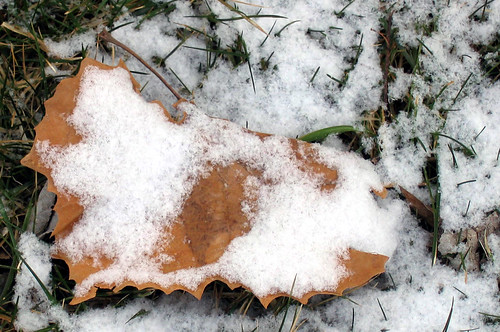
Sycamore in March snow.
(*photo credit)
March 2, 2022 Fashioning Our Lent into a New Opportunity
Let's focus on this Ash Wednesday on the second title word of this Reflection: "Our." Lent is to be part of our collective endeavor, which includes reaching out to non-practicing Christians as well as the practicing faithful. We come to receive ashes and know that this is the time for "our" collective and individual response. The temptation is to put reform off and thus make Lent a future concern. No, this hour is for us to act, the "Our." Let's make the time of Lent present in our lives, an opportunity for personal salvation. God gives us time to use wisely, and Lent is such a time. Today, we recall that all too soon our mortal bodies will return to dust, and it’s good to think about it.
Opportunities are precious temporal space in which benefits can outnumber debits and, by trusting in God, obstacles can melt away. Lent is the right occasion, if we only look up and somehow acknowledge it. If we are vigilant (a perpetual and not a seasonal virtue), we discover beneficial occasions for change that are unpredictable as to a final outcome, but are the moments of our journey of faith. We certainly can make specific plans as to particular changes, but this season contains the freshness of coming spring, the openness to the Spirit who is willing to fill our lives with new possibility; we become open not only to what is done for us, but also for what we do for and with others.
"Our" means that we are to accept opportune time in and among a community of believers. Lent is not just for individuals, but rather is for ALL of us in society. Let's make this Lent a joint venture rather than either abandoning it to those others we think need it, or see Lent as a private devotion period for some personal modifications apart from others. Let's consider Lent as a joint undertaking with others and do this within a parish or community context. The reinforcement that comes with doing things together helps each of us to be resolute in achieving our goals.
Personally, I must resolve to make Lent a moment to choose; the call is to put behind me the allurements that tie me down, and see this opportunity to arise by God's grace to deeper personal and social awareness that incorporates the WE into my personal life. Within each of us, individual choice must be coupled with the growth of a social dimension. A combination of social justice issues with individual choices is the challenge of this Lent. America must overcome the singular "I choose" (consumer with selfish demands) that is clearly divorced from the "Commons" with its joint responsibility and desire to radically share with others. If we do not promote the two together, we are left as selfish individuals. Part of the battle over lifestyle choices and pro-life failures is overlooking the OUR dimension in every choice. Together we move to salvation.
Ash Wednesday Prayer: Creator Lord, you direct us to launch each Lenten season with a humble reminder of who we are. We are from the dust of Earth and to that we will return, but you expect that we be productive between that beginning and ending of mortal life. Each Lenten reflective period we are expected to review our journey in faith and resolve to overcome the imperfections that seem to be engrained in our psyche. Let us know the dust within us and that is under our feet, and be better prepared to make the best of the rest of our mortal life. May the ashes signify our humble state before you, O Lord.

Fr. Al Fritsch and family, members of the Earth Healing team, at People's Climate March.
March 3, 2022 Making An Environmental Examination of Conscience
The majority of people prefer not to delve too deeply into personal actions, especially when these counter a desired portion of our consumer culture dealing with use of resources. However, once in the sober season of Lent we ought to consider where we stand in relation to use of God-given resources. The following is a partial list of questions to ask ourselves in the confines of private quarters:
* Do I waste items that could be stored, recycled, or extended in lifetime?
* Have I rushed out to buy what is unneeded or just after a persuasive advertisement?
* Must I take that extra food helping or desert or other snack food that is heavy in salt, sugar or fat?
* Am I tempted to buy the latest electronic device and regard what I presently have as outmoded or old fashioned?
* Is there some self-righteousness about my practices that have to be honestly examined?
* Should I drive less and walk more if able? Can I car-pool with neighbors?
* Do I dress warmly and reduce the thermostat in winter, or dress coolly and decrease the air conditioning in summer?
* How about my use of lighting? Do I leave lights on and forget about them?
* What sort of environmental reading have I acquainted myself with in recent months?
* Could I use fewer chemicals in the home or in the workplace?
* Ought I to take some extra silent time, especially when overly tired or under stress?
* Are smokers allowed to light up in my space and do I speak up about this dangerous habit in a charitable manner?
* Will I budget the amount of Internet (or TV) time each day?
* Can I find ways to use less water in showering, cooking, watering garden and plants, and in brushing teeth?
* Okay, I'm not perfect; is that so bad or should I accept myself for whom I am?
* Where might I expand my garden space or are there limits to its growth?
* Do I attempt to sign on to one fitting petition each day or a certain limit each week?
* Should I air out clothes and house or wait until spring is in full swing?
* Did I thank God that days are getting longer or just fret about the coming summer heat?
* Why must I be concerned about saving our wounded Earth when no one else seems to mind?
* To whom should I send these questions while avoiding hostility?
Saint Katherine Drexel: Your concern for African Americans and Native Americans has not been greater. You are an example for us all in the concern and attention you gave to these good minority folks. Your concrete establishment of institutions of welfare and education moves us to be more active in our support of minorities as well. Intercede for all of us Americans that we can overcome our biases and give attention to those who are in need of support and reparations; may we be able to counter the injustice done by the privileged ones in the past and move in a spirit of racial justices for all.
Called to Be Listeners
Listen! How many conflicts could be avoided or pacified by good listening from all parties. Pope Francis is inviting all Christians at this time of universal “synod;” we are encouraged to say what is on our minds and to listen to what others say as well. Frankly, I am not a perfect listener, for many distractions always get in the way. But maybe this essay is a feeble effort at needed improvements. We are having a local meeting next week for this very purpose: hear how the Holy Spirit is speaking through our neighbors. My hearing difficulties can be no excuse. We are all called to listen.
Make the effort to listen. In fact, if we really want to listen to someone, we must concentrate and even get the conversation in an audio, visual or written format. We are in a world of multiple and rapid-fire advertisements on all sides, with those of a commercial pitch vying for our attention. Certainly, selected silence is a remote luxury; we have to make choices and turn attention to what is most important at this time. But what is?
Look for a two-way street. A better opportunity for fruitful listening is during a good two-way conversation. Often important leaders are known for the talent or practice of listening to and having meaningful verbal exchange with people. Conversations sometimes involve one speaking, but the other not attending to what is being said either due to distraction or through a bias against the speaker. You as reader may ask me to address comments, and that is my New Year’s resolution. Yes, this essay is really a two-way street.
Get others to listen as well. The onus is not just on me to speak but to draw attention as well. Our desire is for others to hear and respond. We may speak too softly, too diffidently, too vaguely, too lacking in humor or twists of vocabulary. Or maybe the other party has some of the same problems with distractions as we do. In this age of massive social media bombardment and multiple distractions, it is harder to draw attention unless the issue is a scandal or a personal attack. What is our publicity angle?
Give time to listening. It takes time to concentrate on an issue, and the message of another may be important enough to hear. The Holy Spirit speaks to us often through others’ words, so don’t be quick to judge the source without recourse to inspiration. Let’s be ready to stop, listen, and accept what is said as for our own benefit. Often the message is meant for me, if I am humble enough to give it some of my fleeting time.
Thanks for listening and reading this. I deeply appreciate your interest and if you have comments, I’m willing to make time to respond. Yes, let’s all champion the art, talent, joy, gift, and grace of listening to each other.
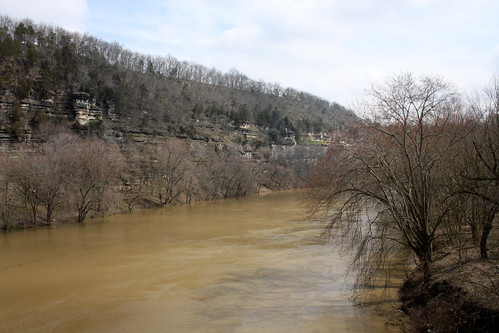
The rushing Kentucky River after March floods.
(*photo credit)
March 4, 2022 Remembering the Sounds of Floods
Water sounds can be so life-giving when we need a cool drink or take a needed shower. On the other hand, raging waters from floods and storms can be frightening experiences. Some water sounds resonate with us many years after perceiving them for the first time. I recall the sound of a flood that came up so suddenly in Rockcastle County that I could watch the swirling water come across the road and engulf the narrow valley with its relatively large watershed -- the sound of that roar and my helplessness in the face of this onslaught remains quite vivid today.
In mountainous areas upstream heavy storms can unloose massive amounts of water that can inundate the landscape downstream in very short periods of time. And floods in these parts can come any season of the year, but late winter floods stand out most in my mind. This is what we recall and show photos of in our book, Appalachian Sensations: A Journey through the Seasons as presented here:
March -- The Frightening Flood Waters
YHWH, the rivers raise,
the rivers raise their voices,
the rivers raise their thunders;
greater than the voice of the ocean,
transcending the waves of the sea,
YHWH reigns transcendent in the heights.
(Psalm 93:3-4), also (Habakkuk 3:10)
I never felt more helpless than when the flood waters reached the highway (KY 1329) and raced down it, showing the speed of the rising waters. I stood breathless and listened to the roar of the tide as it came through the narrow, constricted Rockcastle River valley from its upstream watershed. The runoff comes so quickly with surging water bearing the making of disaster, an unwelcome but all too regular Appalachian event. Flooding rivers and creeks evoke terror in Appalachian minds, especially for children roused from sleep by parents to seek higher ground.
Our love of rivers and creeks is tempered with respect for these unmanageable creatures. Waterways have their quiet moments for wading, fishing, or swimming, but then tide waters swirl and wildlife and humans scramble for a safe place. "If the creeks don't rise" is an Appalachian saying, referring to flood tide. Nature teaches us to treat our streams well but to keep our distance, especially when gentle waters give way to rampage. Nothing teaches us respect for nature better than a rapidly rising stream when the rains pour down upon us.
Saint Casimir: Lord, you inspired Saint Casimir, King of Poland, to be a person of great leadership and special kindness for the poor; he had a special devotion to the Holy Eucharist and to Our Lady. Casimir lived in a period of great turmoil in the late fifteenth century and never reached the age of thirty. Still, he lived a full life. Lord, through his intercession, may the Eastern European Church grow and may those of youthful age show greater devotion within our Catholic faith. We need more examples of such people in our world today.
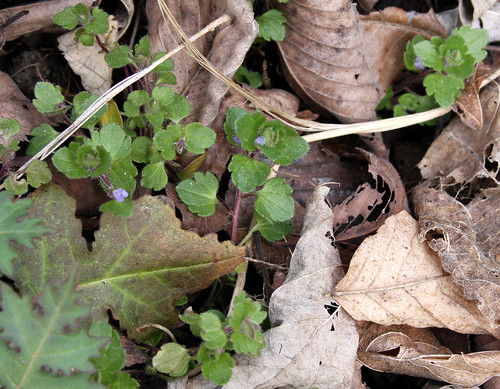
Finding signs of spring in the forest floor.
(*photo credit)
March 5, 2022 Defending Daydreaming among Elders
Your old men shall dream dreams and your
young men see visions. (Joel 3:2)
For an old man to refuse to dream today may go against the prompting of the Spirit and would be a denial of his calling. What if I do not like what I dream about and tend to forget? In my youth I did considerable daydreaming and liked it, since if the story took a wrong turn it could be erased and recreated. Gradually with more demands these dreams dimmed and then there was no time left for such far-fetched pastimes. Daydreaming took up the time of repetitive farm work (hoeing tobacco or replanting corn) or riding a school bus. While these dreams were fiction, they were not so fanciful that they could not have been real. Later I opposed fiction writing and yet had been its unscripted champion as long as I did the composing and character-building.
Now in old age, Scripture tells us we are supposed to be dreamers inspired by the Spirit. In fact, one of the drawbacks is we hope to stay optimistic and yet the journey of our good Earth leads to frightening scenes that we do not want to share with others, in dreams or in real narrative. If the climate changes in ways currently forecasted -- and we fervently hope those are wrong, the extreme conditions will put great stress on the world of the next generations. Perhaps the Spirit is prompting us to reveal these dreams, since in doing so we give a bit of wisdom to those who deny what is actually happening. Failing to daydream the practical result of current trends makes us no better than people immersed in status quo and refusing to face reality today.
There's a time for everything under heaven. While not liking to daydream in older age, I did create one piece of fiction representing one of my nephews when he becomes as old as I am. The story is of a grandfather taking a trip with his grandchildren out West in 2050. The world of thirty years hence is not presented as a fully likeable place, but it has good moments. This was the last work I showed my co-author/editor Kristin Johannsen before her untimely passing in the autumn of 2010. In fact, she gave me a detailed critique a month before her passing -- and said it needed much work. So I put it aside, where it still remains today.
Daydreaming with such a story is perhaps worth resuscitating. Prophesy is seeing the future if the present continues on its inevitable course -- but won't little twists and turns make it unbelievable a few years from now? Older age is a good time for dreaming, not of impossible futures or overly optimistic ones. If we could freely dream in sleep and write them down with prefect recall, it might be fascinating. But even more à propos, "Is daydreaming a healthy approach to a somewhat sick world?" Perhaps we elders have a role to play in our overly busy world.
Wind Prayer: Creator God, you are all powerful and have created all things that move, including the winds of this month. We recall your power when flushed by gentle breezes or the rare, but more frequent, hurricanes and tornados. We respect this potential naturally occurring power and yet strive to harness the power of wind as a renewable resource. You, Lord, make us ready to accomplish the controls of wind needed for the benefit of our people. Lord, the Spirit blows where she will -- and so does the physical wind. May we listen to the first and help control the second.

White-throated sparrow, Zonotrichia albicollis.
(*photo credit)
March 6, 2022 Tempting the Earthhealer Today
No doubt we are all plagued by temptations and so was Jesus. In previous reflections we treated Jesus' temptations in the desert: power (a king in the worldly sense), materials (convert stones to bread), and fame (jump off of the Temple's pinnacle). After saying much on the varieties of temptation and how we are to respond through self-discipline and praying for courage to say "no," we are still left with subtle temptations concerning our Earthhealing mission that can go undetected, or dismissed as of little `importance. It is not so!
Temptation One: Ensure our credible and secure position. This is the desire to have bread enough to complete the journey, but we live by more than bread alone. Alone, each of us can do very little, and so we strive to discover those who can assist us in our mission and help us confront opponents. Healers may be gentle and meek to victims, but not to culprits. It is not right to let matters be if harm is ongoing. We can also hope that those with differences are not so set in their position that they cannot be persuaded to hear and know where we stand. We must join forces and confront those sapping vitality from our Earth -- and often go unchecked. Our denunciation is vital to ultimate healing.
Temptation Two: Work with the Powerful. We are tempted to think that we ought to associate with wealthy and influential people who appear friendly and thus gain their favor. Thus, we are tempted to be silent about the current economic system and its many materialistic manifestations. On the other hand, we can delineate differences by showing clearly where we stand. With courage we state that our troubled world is on a non-sustainable path; this is due to a consumer-oriented Capitalism in which our globe is immersed, from America and Europe to India and China. The pervasiveness of the current system should not tempt us to be "politically wise" and let the status quo go unchallenged: new renewable energy technologies need promotion; a fundamental economic change must occur ASAP; we must lead the way.
Temptation Three: Tinker with fame and others will undoubtedly follow. We are tempted to see ourselves as gods who can perform major changes, and so we act as though our power will attract others to our cause. On the other hand, a responding humility is necessary to recognize that spiritual empowerment comes in recognizing that God is in charge. Our cooperative endeavors are performed in an awesome respect for the Resurrection coming alive in us as renewal of Earth unfolds. Our small actions are part of the cooperative venture with the Lord -- and Good news involves inviting others to partake in this venture by sharing resources.
Prayer to Overcome Temptations: Lord Jesus, you know we all are tempted just as you were on occasions. We need to have a spiritual insight and willingness to call constantly through the Our Father to be freed of allurements which are not to our benefit. Keep us from sins of pride, fame and arrogance; make us love and not judge our neighbor; help us to know our sins of omission and spend time considering how best to address our duties. Lord help us at all times and places to overcome temptation and follow your example to holiness.
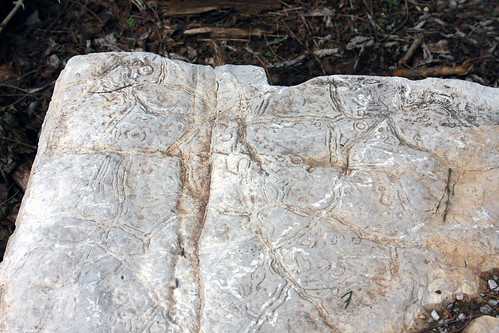
Intricate fossils in "Kentuck River Marble" (limestone).
(*photo credit)
March 7, 2022 Reviewing the Temptations of Perpetua & Felicity
Today is the feast of two North African martyrs who died in 203 under the persecution of Septimus Severus. Perpetua, a catechumen, not even yet a Christian, was a married noblewoman who had just given birth to a son and with her pregnant servant Felicity was arrested hauled before the court for refusing to honor the emperor as a god. Her aged father pleaded with her to renounce her beliefs; all she had to do was put a grain of incense in the brazier before Caesar's image. She became the first Christian woman writer of her exploits given in the Passion of Perpetua and Felicitas, a short essay quoted frequently by St. Augustine and honored in the early Church. I reread the story often.
I am no Perpetua by birth, language, age, sex, color, social or religious status, or even physical martyrdom by wild beasts. With such differences, why an affinity? Because I am a fellow Christian pressured to renounce what I hold. A decade ago, a very successful Catholic businessman saw my letter-to-the-editor in the National Catholic Register calling for fairness in comments on the 2012 national election issues. He admitted to differing from my position and that he had read this column; he said openly that he would like to convert me to proper views on what I call a "dysfunctional global system." He attempted to get me to categorize my position, saying he was from a progressive liberal family that saw the light -- and his CV had ivy league strands.
From the materials that he voluntarily sent me were what he regarded as "facts." If I only reflected like he did on what seemed to be four themes and admit to them, there would be no financial worries. His emails were frequent and enticing. If I would at least come to his position, I could receive a generous donation. It was just a small grain of incense.
Since this was a difficult year for money needed to keep this website open, I must confess I was tempted. At one time I thought of equivocating (Jesuits are supposed to be good at this). I would try to convince him that he was having an effect. So in truth I called his contributions "interesting" (a neutral term), though in my initial correspondence I called his views "BS," having known the material by growing up on a dairy farm. The theme-gods that he wished me to offer obeisance to seemed to be to accept the following: doubt that climate change is of human origin; the wealthy know how to make economic judgments because of success; the system is quite sound if the wealthy can have their way; and the Church (specifically the Pontifical Council for Justice and Peace) claims no teaching authority on matters of economic and finance. Since his health appeared to be threatened by efforts in opposing me, I cut off communication -- and in one final plea he reminded me of losing a large contribution. So be it!
Saints Perpetua and Felicity: Holy martyrs, Perpetua and Felicity, you showed extraordinary courage in martyrdom for your faith, even while caring for your infants. You overcame the requests of a parent to just add one pinch of incense to an idol's brazier, yet you chose Christ instead. Perpetua, your forthright message as first woman Christian writer inspires us each time it is read. Ask God to give us courage to do what is right in times like these, which are truly troubling ones.
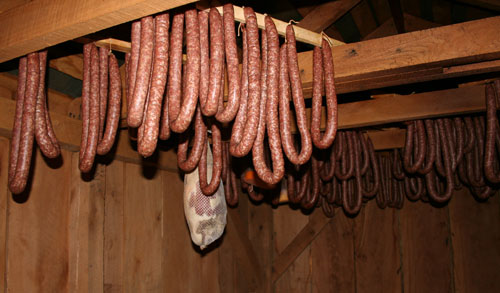
Homemade sausage and ham.
(*Photo by Charlie Fritsch)
March 8, 2022 Making Sausage
On International Women's Day I could relate once more the many vegetable and flower gardening, food preserving, butter making, cow milking, yard caring, and homemaking tasks that my mother performed; let's not forget raising and dressing chickens, helping with crops, bearing children, and saying a rosary every evening. Only one occupation in my memory did she dislike -- making sausage into links (some paddies were canned and she liked doing that). The homemade sausage links in six-foot sections have a transparent outer lining called "casings," still sold by the English measure called "hank," (the term generally used in spinning days for commerce in yarn and thread).
The unfortunate part of the process that Mama hated was cleaning out the hog intestines contents and scraping the outer layers of fat and tissue on a board in a pan of water, in order to leave a transparent lining or "casings." In fact, each intestine had to be turned inside out and that side scraped as well. Needless to say, the process left an indelible mark on Mama. When her memory was failing in her nineties, we kidded her while she was observing us making sausage at my brother's place. We invited her to help us clean casings, and she shouted with full memory returned, "Casings!" How cruel of me!
The final sausage product did not reflect her disfavor at part of the process. In fact, she and my father had a partnership in preparing this delicacy with its exquisite taste that involved spicing to taste, smoking the sausage, and cooking at the proper time and occasion. The aroma of sausage filled the kitchen air for a hearty breakfast and at other meals as well. It was generally eaten with homemade catsup and bread along with fried potatoes with onions. Such fare could keep one going all morning. Sausage dishes also appeared at other fancy meals with sauerkraut and along with a wide variety of vegetable and other dishes (300 recipes are available on line for pork sausage).
The sausage, as made later by my brother consists in following handed down recipes -- using salt, red and black pepper, sage, and garlic for flavoring. The long coils of about six feet of sausage links are tied at the ends and placed on a stick for smoking in a "smoke house" using hickory wood. The smoking is also used for home-cured hams, and so the process is an art in which some of our family excels. Meat preservation requires it to be done right. Good sausage depends on choice selections of the best meat -- pork roasts and pork chops go into our German/Alsatian sausage along with ham and shoulder trimmings. We have never reflected on "hog-killing" as such, though it was a winter ritual usually occurring after tobacco was stripped and marketed, so it often was a winter chore. We needed cold weather.
Holy Anger Prayer: Jesus, you cleansed the temple and challenge us to do the same. Can we make this space, so controlled by the wealthy and powerful privileged, a Commons for all people? And can we do this, Lord, without losing control of ourselves? You teach us a lesson to act with the Spirit and to be willing to go so far, but not to resort to violence. You tell us to learn that extremism is not the way, but rather to testify in a controlled manner that establishing the Commons for all is a duty of all, not an extreme practice by only a few. Give us companions to assist us in our service to you.

Lycoperdon pyriforme, commonly called pear-shaped puffball.
(*photo credit)
March 9, 2022 Dreaming about the Future: Alternative Scenarios
Daydreams differ from those in sleep because we can modify them to become ever more realistic. We prefer better solutions to seemingly inevitable world problems; thus, daydreams look at ruin and disaster and can replace them with success and happiness. Prophets speak of what will happen unless -- but the unless can take two courses: here are alternative ways of daydreaming, one resorting to becoming a remnant awaiting a better future and one involved in actually building a New Heaven and a New Earth:
1. Freedom contracting -- Our series of beliefs can erode when positions are out of fashion, and holding them is a form of "bigotry." Because of paralysis in certain democratic lands, more authoritarian regimes may come into the fore. Because it is so unfashionable, church attendance diminishes in areas of former affluence, especially in countries undergoing persecution. Free expression can be strictly curtailed and mention of past history is strictly forbidden. Travelers find it hard to practice religion.
An alternative picture finds freedom expanding. Though secularism seems to triumph, there is freer expression in speech, voting, and ways of expressing religious belief has flourished worldwide. The entire Christian community (though still diverse) has become far closer through an ecumenical council in which virtually all Christian bodies participate. Religious communities flourish in Asia, Africa and the Americas.
2. Environmental nightmare or possibility -- The longer-range goal has been to keep global temperature increase to two degrees Celsius (3.5F) since the start of the industrial revolution (it has risen 0.8 degrees to date). This now seems impossible since carbon dioxide levels have risen 50% since the year 1990 and the pace of growth is not coming down; our country has been slowed by a lax 4-year administration. Will all this bring rising oceans, melting glaciers, floods, droughts, and threatened flora and fauna?
An alternative world involves a concerted effort to convert to renewable energy in wind, solar, hydro, and geothermal and to do so in an equivalent world system where the local regions have greater autonomy. Weather patterns return to a manageable level.
3. Instant communications disaster -- Revolutions in technology make world connectedness a reality that allows us all to be far more closely linked than before. The disturbing reality includes knowing the bad side of poverty and seeing it as if next door. On the other hand, the media is vulnerable to sabotage and the entire interconnected world is paralyzed.
An alternative scenario is to eliminate spam and to take care of the unattended by instant response teams who act like the 911 corps of the world, and these have to some degree sought to replace 20th century militarism.
Prayer to Control our Anger: Jesus Activist, we observe how you acted in the world. At times you were excited to holy anger, a delicate matter. We look closely and realize that it takes self-control and nearness to the Holy Spirit to do this well. At times you spoke and acted; at other times, as on Good Friday, you remained silent in the face of accusations. Teach us to follow you at times when we must act and in times when we are to remain silent. Help us know when to be truly prophetic.

The "Pasty," with potatoes and other veggies. An ethnic Cornish meal.
(*photo credit)
March 10, 2022 Choosing Moderation, Proper Food or Dieting
Moderation in all things is what is sought, especially by those of us who desire to eat properly while dieting only when necessary. Here are a variety of helpful hints for losing weight without really dieting. Many like to construct a dual listing of "eat this... instead of that." This includes whole-wheat pasta, pretzels, and bread instead of white pasta, pretzels, and bread.
Moderation is a key part of an examination of conscience when it comes to food. Many of us slip in some categories from occasional to frequent eating between meals, even though the snacks are of better quality. It is as though good food can be consumed often. I am also plagued by proximity to a refrigerator with well-stocked higher quality food -- and input at various times of the day is possible and, in fact, actual. This is more a winter than summer problem, but causes weight gain -- with healthy food.
Proper food can be the basic theme and yet we may have problems. One of these is salt which is a problem even when I do not use a salt shaker. I do not use soft drinks, but have the habit of substituting with vegetable and tomato juice -- except that through heavy consumption the daily salt content can become easily excessive, potentially increasing blood pressure. Water is the proper alternative -- and, besides water, snacking includes fruit and raw vegetables, unbuttered popcorn, seeds, and nuts instead of cookies, potato chips, and crackers. The same advice goes for use of brown rice instead of white rice and high fiber instead of sugary cold cereals. I prefer old-fashioned oatmeal and brown unpolished rice.
Dieting is not an easy matter; both a combination of moderation in serving size and selection of proper foods (less salt, sugar and fats) taken together are easier to adjust than an official diet of some sort. Our poorer Appalachian region does not have all top-choice materials in stores that some of us frequent, nor at prices that we can afford when we have budget problems. An answer is growing one's salad and soup ingredients, because fresh veggies are so expensive in stores.
I really don't like to talk about good and bad foods -- and we discussed this when our CSPI produced "Nutrition Scoreboard" a half century ago. Active people with no weight problem would say that certain foods, such as fried chicken, are good. In youth, we had this more often than the rare once a week, but we did heavy farm work to work it off. I prefer a broad appetite that can be weight-inducing when not fully physically active. However, let's talk about moderation in all things. Certain treats that someone likes ought to be rare, whether that be fried chicken, fish sticks, or chocolate candy. A food class called "never" is only meant for those with specific allergies and other health conditions.
Prayer for the Contrite: Lord, open our hearts to your word during this season of Lent. Let us be awake and willing to see our faults and ask your forgiveness for the mistakes made in our weakness. Purify us in this season so that we might become more effective proclaimers of your word. Let this be a time to confess our faults and prepare ourselves for the Easter events. Let us look ahead and be of service in bringing the world to a New Heaven and New Earth.
Called to Be Speakers
Whether Church leader or lay folk, we are invited by Pope Francis to participate in the upcoming Church Synod. Last week we spoke about proper listening within the assembly. Now we are asked to take the added step of speaking at scheduled preparatory meetings. We know how frustrating it is to want to express an idea, but the opportunity never comes. This is a kairos, a time of reckoning, and so truly consider it as such. In a noise-filled world the Church is providing some quiet space for us to come, listen and speak about our desires, hopes and problems.
Recognize the desire to speak. The Holy Spirit speaks through the baptized at many times and places. Recall that one of the ceremonies in the formal Baptism rite involves touching the ear to hear the Word of God and touching lips to proclaim that Word. Speaking takes more courage than merely hearing. How many of us at an important event have the temptation to say something, but find it too difficult to be singled out for such a public display?
Speak plainly to the subject. This moment is important for all to hear
and accept as part of the voice of the Holy Spirit. This is not a gripe session, but one that is meant to be beneficial. This is not meant to be political rhetoric
or a debate point with others, or a time to score quality points for future recognition and advancement. In a world of many problems and distractions,
one must realize that our voice is important – and that the Spirit can speak through us, as part of the grace of Confirmation. We all have something to say.
Prepare what to say. While this should not be an exercise that is stressful, still the opportunity to speak must be considered an acceptable time, a moment to open our minds to others. Say a prayer that the message is heard and received as it ought. Realize that it is a contribution which can make some mark on the universal discourse – but is by no means the last word. Consider asking a friend beforehand whether your remarks are able to be easily understood. Suggestions for improvement are helpful, even though some spontaneity may be forthcoming, when inspired by the Spirit.
Make no apology. Your right to contribute is accepted by all and any act of humility is not to deprecate one’s own remarks, but to say them freely and with firm conviction. They may consist of seconding what another has said, but even that is important. This is a moment in the sun and should show our best qualities and hopes. Take time to say what you feel needs to be said.
Show gratitude. We always thank God for being here and for the ability to speak and express ourselves. This is again such an opportunity and an element of dependence on God is most affirming at this time.

The appearance of crocus flowers, giving hope of winter's end.
(*photo credit)
March 11, 2022 Creating an Emergency Grab-and-Go Kit
I live less than ten miles and downwind from the Bluegrass Army Depot (the largest chemical weapons stockpile in America). Great pains are being undertaken at this time to destroy these mainly nerve gas agents within this decade -- and hopefully no accidents will occur over this period. But the Government is taking no chances, and so issues each year a calendar to every household in our county (Estill) and the country where the depot is located (Madison). Our evacuation routes and destinies are listed. Items to take depend on time span to begin evacuation:
Most necessary items (2-minute notice):
* Keys to escape vehicle, hopefully with adequate fuel
* Shoes and minimal clothing
* Glasses and personal aids
* Wallet with personal identification and money
* Evacuation route
* Cell phone if one is owned
Next priority items (5-minute notice):
* Medicines for all family members
* Change of clothes and personal toiletries
(I keep a pack of these in the car)
* Pets, if transportable (some would put above)
* Address book
* Prime computer disks or flash memory
* Flashlight and batteries (keep in car)
* Turn off utilities
Next priority items (10-minute notice):
* Favorite pictures of family and friends
* Financial records
* Computer if portable
* Water supply (bottle plus gallon jug)
* Box of canned food and can opener
* Sleeping bags, pad and towels
Last priorities (20-minute):
* Bag of clothes for longer stay
* Books for reading
* Bag or cans of pet food
* Pillows and blankets including "crash" blanket
* Tent and camp burner
* Box of perishable foods
* Children's toys (if in party)
It is wise to review what actually is stored in your vehicle at this time: auto paper work, medical records and such items as tire pump and battery cables. One may increase the preparation by keeping camping equipment in the car. Some include photos and financial records.
Prayer to Overcome Desolation: Lord, at times in this late winter, we may have moments or longer spans of being down in spirits. The world seems empty and void; our prayers have little zest; you seem so far away; and I may feel the isolation of those who are caged. It is not a happy state and yet some believers have the dark night of the soul, spoken of by John of the Cross. Help me recognize this condition of desolation, realize that it comes and goes and is often barometer-related. You give us good things and prepare us in hope for brighter times. They'll surely come. Give us the patience to await your consolation.

A natural collage in a rock garden.
(*photo credit)
March 12, 2022 Celebrating Good Samaritan Day Tomorrow
How can one celebrate Good Samaritan Day? In this age of diminished resources when the bulk of our incoming mail is begging letters, we wonder about our charitable-giving and what it means. There are two types of Good Samaritan, the one who has to give an instant response due to an extreme condition (a fire or storm or accident requires immediate attention), or the condition that takes time to answer because the condition is more chronic than acute. The Good Samaritan parable found only in St. Luke's Gospel involves a healing possibility to which we are called to respond.
Privilege -- 'It is better to give than receive' could apply here, though giving service forces us to change schedule, lose precious time, and exert a special commitment on our part. Only the more spiritually mature will see such events and people entering our lives as God speaking to us. In the poor victim whom we encounter, we find someone calling on us to grow deeply in the act of giving. The call to us should be reason to celebrate.
Openness -- We pride ourselves by helping another in need before we inquire as to whether this person is one with us in faith or other forms of relationship. A human being needs help and we respond immediately and without stopping to see whether we could rationalize our refusal to help. We must be human.
Counter to a culture -- Gradually we come to realize what it means to be neighbor to another, even someone who is alienated from the community. Recall in the parable, the first two would have been contaminated by the blood of the wounded person and so passed him by. So often in our society the passersby are average people who expect us to do for them what they would do for us in times of need. We may be criticized for interfering in the accident situation before the professionals arrive. The commonly held position is that victims have gotten themselves into the situation, so let them get themselves out. That is NOT human compassion.
Sensitivity -- An inability to see others in need occurs with a blindness resulting from affluence. If we live at higher levels of expectations and material comfort, we have little idea of what is happening when the victim is in real need. Are we tempted to divert our eyes and not see him or her; it is so simple. But the Good Samaritan has the spiritual insight to see and respond to the need because neighborliness requires instant response. It's human.
Merit -- This is the least to celebrate for we do the task at hand for more than to be credited in the future for doing good. However, while of imperfect motivation, the act may have a certain quality about it that is what is expected of believers. We help another; that will overcome the blemishes of our past and this is worth celebrating at least to some degree. It's just human.
Prayer While Fasting: Lord, direct our fasting moments to be precious ones during this season of Lent. Purify our intentions so that we perform this exercise with a loving heart and that we offer the efforts we undertake for the betterment of a world plagued by high food prices and scarcity, for this condition affects so many of the destitute of this Earth. Let us see the need to fast and the benefits that come from so acting.

Sharing a moment with a friend.
(*photo credit)
March 13, 2022 Earthhealing and the Power of Transfiguration
Master, it is wonderful for us to be here. (Luke 9:33)
The words in this quotation from St. Peter after awakening from a trance at the Transfiguration event are quoted along with the afterthought that he did not know what he was saying. In one sense, the words had deeper implications than the mere utterances of a drowsy person. We can repeat at this time of an emerging troubled world that it is wonderful that God has called us to be here at this time in history, in fact, we are blessed to be privileged to serve the Lord today. Do we know what we are saying?
Signs take on significance -- We have before us the Transfiguration, which signifies that what is shown as a fleeting radiance is the preview of eternal glory. We look ahead in Earthhealing to a new and revised glory when what has been ravaged by pollution and resource depletion can become something renewed. It is the promise of the Lily of the Mohawks when her disfigured face during life was transformed into beauty at the time of her passing to the Lord in death.
The Privilege of Serving -- We always need to see that with faith and a dose of good mental and possibly physical health we can be of special service to the Lord. Often people lose hope in what they can do; they throw up their hands and seize allurements, some harmful and others frivolous and consumers of precious time. We are called to help address the dispirited and those drugged or cowed into silence or busy work that makes little sense.
The Promise of Prayer Answered -- The Lord says our prayers are always answered. We can hardly expect to pray for miracles, which are in these times of needed action a hidden desire that we stand back and allow God to perform. Through prayer, we realize our own powerlessness when acting alone or being satisfied as spectators. We, like Peter, are moved through impulse to memorialize brief glimpses of glory. We must be more than mere passive spectators at the Transfiguration, though at times we have our consolations that give us that preview of eternal glory. In the post-resurrection period in which this Gospel narration was written, the faithful are transformed by faith into participants.
Faith in Power through Resurrection -- While we are powerless on our own, still with faith in the resurrected Lord we take on a spiritual empowerment that will transform a wounded world into a healed one. We believe firmly that this is possible as part of Easter hope; we discover that God has more wonderfully empowered us to act in ways we never realized before. We can change the world around us, if we believe that God's power can work through us.
Grace of Consolation: Jesus, you received consolation from the words of the Father; this occurred through a glorious Transfiguration on beautiful Mount Tabor. All of this occurred as part of the road to Jerusalem, with its suffering and death; the future became present with radiance. Here you were flanked by Moses, greatest of lawgivers and Elijah, greatest of prophets. You needed, as all humans need, some blessed moments of consolation. You allowed Peter, James and John to witness this event and to be profoundly influenced by the radiance of divine glory. May we discover these gifts in our lives, show gratitude and be fortified for the rough road ahead. Lord, continue to console us as we come closer to you.
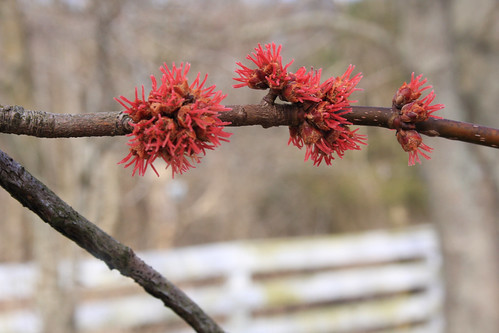
Flowers of the silver maple, Acer saccharinum.
(*photo credit)
March 14, 2022 Recognizing Gunbearers as Insecure People
Recognizing the topic of gunbearing for Second Amendment interpreters can be a hot button issue. On the weekend following the Sandy Hook Massacre I was notified by a church member that he would not come to church if I mention gun control. I would have said the "last" mass killing but this homily on another subject was written at the time. I really hadn't intended to talk about gun control, for I regard diversion from Luke's account of John the Baptist's ministry (or any homily theme) as going contrary to the Advent (and liturgical) spirit. However, it was of interest that this person was so insecure that he opposed a possible theme. Instead, my attention like the rest of the country was turned to millions of school kids who were aware of the killing of the little ones and didn't want to go back to school. What do we say to them?
In my rosy red country, it is far easier to talk about renewable energy (our solar units on the roof) than to talk about guns and their control; this is so with a majority of homes having a number of hunting guns and a few for protection. I look a little deeper at some of these stern instant reactions and find a massive insecurity that guns (Americans have more than people) must not be controlled even if it is possible. Insecurity is behind a massive trillion-dollar military system that simply reduces security.
Insecurity or the failure to trust in God is behind so much in our society. The week after the Sandy Hook massacre saw massive purchases of semi-automatic weapons and ammo. Why? Because these fearful potential gun owners had to have weapons and ammo before the government at a state or national level might take action to restrict possession; that could include declaring these weapons of mass destruction and their ammo as banned from insecure bullies who needed them for supposed security. They could not dream of a home without an arsenal (like we had at our home when growing up). Guns are an illusion as to security and yet gun owners smother their insecurity with the constitutional right to bear individual arms. It is pathetic to have the "wimps with arms."
I realize the thinking of our people and seek a practical position of restricting and controlling ammunition and not just certain weapons. Without access to large clips and with few shots allowed per gun bearer, we could bring about some control while the insecure gun-owner still retains his or her trusty piece. The assumption is that addicted people can control themselves with weapons. It is as though auto license holders should zoom through a playground area at top speeds because it is fun. "Cars don't kill, only killers do." The other alternative is to allow muzzle loaders frequently within the time of the Constitution writers -- not automatics or semi-automatics. In other words, restrict but not totally, or else the insanity of uncontrolled weapon and their misuse will continue to plague us.
Dandelion Prayer: Lord, Creator of the plants, you give us an early blooming dandelion as a sign of resurgence of life. We thank you for this gift of yellow blossom, nutritious leaves, and savory root. Many call it a "weed," but it deserves a better name; it requires no cultivation and is quite hearty and a flourishing plant in times of hardship and hunger. Lord, we see this plant as a symbol of calling us to renew our Earth and enliven our environment. May we continue to value simple things of life.
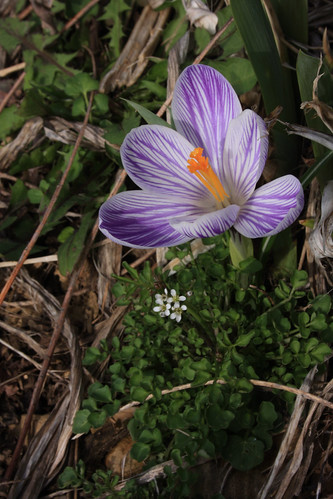
Admiring the March crocus once again, in purple.
(*photo credit)
March 15, 2022 Being Slow at Handing Out Superlatives
We know people who like to hand out superlatives as though they have a fist-full to pass around to friends. "He was the kindest person." "She was the most lovable person." Maybe others found the deceased to be a penny-pincher and one who never shared much; yet being a faithful mourner the one knowing better refuses to speak ill of the dead. On another occasion the guest is introduced by a string of superlatives to which members of the audience take offense. "She is the greatest contributor to this community project," when another quietly did a greater part of the work yet went unrecognized. If God is the judge, another who is never pointed out may have been the greater person.
Jesus actually gave out a number of superlatives to the little widow who gave out of her need to the Temple treasure, and the superlative to his cousin John the Baptist upon hearing of his death, calling him the greatest born of woman. But Jesus will be the ultimate Judge of our scores and so deserves to hand out the superlatives -- but we don't. We ought to be a bit more modest in our complimenting and most surely in denigrating another.
First, a superlative means that we are superior in being able to decide who is the right person to deserve such a special title. Perhaps, in such a delivery, we have assumed the high role of making ourselves the sole judge of character. Only God judges such people with complete fairness and there are literally billions from whom to choose.
Second, we could be only showing our ignorance about omitting another, who as listener knows someone far better to be placed in our category for superlative. "He is the best pitcher in the world." Really? Have we exhausted the search of all pitchers to make such a statement? Are we the ultimate judge of others good or bad deeds? Instead of saying this person is best or worst, we can qualify and say that he is the best or worst) in my humble search.
Third, it brings back times we have made such assertions and then lived to regret them by offending another who is present. I once bragged about my father's meat-curing skills as the best in the county and found others deeply offended when they thought their dad fit that category. Giving superlatives to one is far different than simply saying the person is very good and letting it go.
In fact, in the casting of good terms, other than God, no one deserves superlatives -- and it is both embarrassing for them and lacking in any true validity on our decisions. I think we all ought to think of people's good qualities, but leave it at that and not allow our judgment to make them the best (or worst). In eternity we may be in for some surprises.
Prayer for Loyalty: Help us, Lord, to stand up for our brothers and sisters and defend them when they are right. Never let us be caught in hidden plots against others, but always wish them well and pray when they need assistance. Let us not forget that this is the Ides of March. While practicing to be loyal, we must be aware that this involves costs and even at times risks to wellbeing and life. May we always be loyal to you, O Lord.

Lenten roses, the hardy helebore.
(*photo credit)
March 16, 2022 Seeing Limits to Physical but not Spiritual Growth
The shocker to many Americans and those from other affluent countries is that there are limits to growth -- that is, physical and material growth. The Betrayal of the American Dream, a best seller a decade ago, told about this fading (unrealistic) dream in a very vivid fashion. We do not want infants, gaining many percent of body weight or inches in height to continue such growth rates, because having elephants or twelve-foot tall adults is not our expectation. We expect limits, but perhaps not according to the aspirations of Ben Franklin, that is, limits to amounts of physical wealth and property. Democracy would be far better off with specific limits, and Franklin knew it. With globalized finances and hedge funds the limits for groups "too big to fail" become critical to controls. We must think in terms of limits not so much to acquiring but in holding and retaining wealth.
The culture of greed flourishes with those who have received everything that they ever wanted. This applies to individuals and to entire nations; they expect a continued procession of good things. Can they (and we) accept limits to American growth and discover in the process that a new American dream may have happiness as its goal -- not material profit-motivation? The nation of Bhutan has a Gross National Happiness instead of material measures of success. We could profit through imitation.
The title above made more succinct could be "Spiritual Growth is Unlimited." The focus there is on the spiritual growth itself and is not contrasting it with the American Dream of sons and daughters becoming multimillionaires -- if they win the national grand sweepstakes. Let's turn attention to spiritual things. That is what the gift of "priest, prophet and king" refers to when anointed in Baptism/Confirmation. We do not have to eat locusts and honey and live with clothes of camels' hair to still be somewhat similar to John the Baptism. We are also called to bring people to Christ. The challenge when we give charity is to elevate the poor beyond a material American Dream. Invite them to dive into the infinite ocean of God's love, a spiritual quest.
We are challenged through our prophetic role to rise to a new motivation as an American people, one where consumer spending recedes. Let winning be trying to be first in changing rules for profit-taking from money, to acts of sharing resources. In some primitive societies the one who is able to serve the others better is the serving leader, not the one who has more goods than others. We must call into question the very economic system that has made people gullible consumers bent on spending what they can grab, and then continue the insatiable quest for more. We need to acquire a reasonable use of energy resources. But as a nation we do not need people to make exorbitant salaries or material profits, and show these as models for others to seek to imitate.
Prayers for the Anawim: O God of the little people, give us the foresight to be disturbed about world conditions, the strength to speak up in a prophetic manner, the power to resist the temptation to be silenced, and the ability to continue the fight, even while we are marginalized. Make the margins where we dwell miraculous centers of your spiritual power, in ways that confound the world and lead ultimately to its renewal. Let us be among the poor, enabling all in solidarity to rise to higher places.
A SPECIAL NOTE FROM FR. AL FRITSCH:
The Ukrainian conflict (WAR!) began after our winter Daily Reflections were written, but deserve some special notice. This invasion breaks our collective hearts to learn about the suffering and deaths of so many innocent people – and we pray for the return to peace. Furthermore, from an environmental standpoint this struggle could be devastating for several reasons:
First, from the current climate curbing effort, the disharmony will weaken the needed collaboration to limit global warming within the 1.5-degree Celsius limit and keep us from catastrophe. Russia is a key player as the second largest supplier of the world's petroleum. How can this nation be brought back to the negotiating table given current hostilities?
Second, warfare of the sort now witnessed consumes fossil fuels in large quantities, both to operate tanks and trucks, and with the potential destruction of large storage areas by the other conflicting party. Keeping planes flying and the land and seas military moving are enormous undertakings and much depends on the length of time of this conflict.
Third, the attention that should be expended right now on extending renewable energy resources throughout the European Union and the Russian federated states is postponed and given far less focus than must be pursued in our fading window of time; likewise, the same could be said about needed critical energy efficiency and conservation measures.
Last, but not least from an environmental standpoint, is the possibility of damage to the numerous nuclear powerplants within the Ukraine. If one of these power facilities is involved in a repeat of Chernobyl, then a vast area of Europe could be endangered by radiation. The possibility of such damage is very real given the nature of the hostilities.
The loss of life is a horror in itself; the environmental consequences must not be overlooked if this struggle continues for any length of time. Let's pray it soon ends.
-- Fr. Al Fritsch, SJ
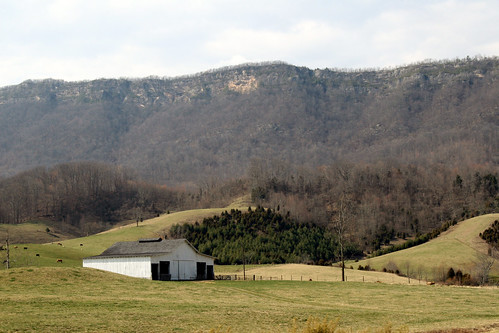
Rural scene in Lee Co., VA.
(*photo credit)
March 17, 2022 Hemp-Growing Is Legal Again
The time has come when hemp can rejoin corn, wheat, rice, and cotton as a major American agricultural crop. It is an extremely versatile fiber, easy to grow, and now an inviting money crop for some hard-pressed farmers. Kentucky would like to return again to being the leading hemp-growing title it held in the 19th century.
It's not marijuana. One argument that stalled reintroduction of hemp to American agriculture has been its close relationship to its cousin marijuana. This is more a question of failure by police to distinguish the two plants. Believe me, no one wants to smoke hemp. Besides, it was the efforts of the synthetic fiber industry that opposed hemp-production and removed it in the early 20th century; this lasted except for a brief period in the Second World War, when it returned to cultivation in Kentucky due to loss of foreign natural fiber sources. Why talk of marijuana? Because the confusion in identity is the supposed reason for suppressing hemp.
Hemp is good farm economics. Hemp was introduced into our state in 1775 at its first white settlement. Kentucky was leader in the nation in growing hemp from 1840 to 1860 and hemp was the leading cash crop until 1915, when tobacco gained precedence.
Hemp is good ecology. Hemp takes little pesticide and can be grown with low tillage requirements. It can replace synthetic fibers in bags, coverings, and a host of other textiles made from petroleum products. Include resource cost of oil refining and chemical synthesis in counting environmental impacts.
Hemp-growing is an example of insourcing. The decline of hemp cultivation had several causes. One was that steamboats replaced sailing ships with hemp ropes -- but there were so many other uses of hemp products. Another reason was that hemp shifted to the Philippines and other lower-cost foreign sources where imported jute, sisal, and Manila hemp supplanted it. Expenditure of farm (slave) labor before farm machinery must be partly to blame.
Hemp is a healthy replacement for tobacco. Tobacco has shortened the lives of millions, whereas hemp has no such record (except hemp ropes for hanging). With labor-saving means of production, hemp now takes less hand labor than tobacco and can be grown far more economically using modern machinery.
Hemp has a multitude of uses. Some estimate 25,000 uses for both stalk and seed in areas of fiber, food, and feed. In the past, American flags had hemp fiber as did the U.S. Constitution.
Hemp-growing is versatile. The crop can be grown in many different types of climatic and soil conditions and thus has national appeal in agricultural circles.
Prayer to St. Patrick: Lord, hear our prayer. While many of us Americans are non-Irish, we do represent a country where St. Patrick's feast day is better known and celebrated than any other saint. Look upon us as people in need of your grace, for our nation is divided between liberals and conservatives; we do not at times seem to have enough in common to find agreement. Please instill in our people a desire to be reunited on many issues, so we can live in the peace which you have now blessed the Irish with.
Awaiting the Spring
“Goodbye” winter, and “hello” Vernal Equinox. For many, but perhaps not everyone, the grand season of Spring comes before us with all her hopes and joys. We may be toddlers awaiting one of our first seasonal changes, or we may have nine decades of experience to spice the season. Granted, we can’t deny that some have other favorite seasons for a variety of reasons. So be it! But is not the springtime a little more inviting than the drab days of late winter?
New life is coming and it is worth celebrating. Most of us like the opportunity to have a brand new start, for the old can wear us down. Yes, it is Lent, but that means “spring,” and so now makes us all the more aware that light equals and conquers darkness in this tired world. And new sunlight is always worth celebrating. I suspect that some overlook the upcoming change, because they are busy with other issues. But nature is a pleasant reminder that our awareness of the created world around us is worthy of gratitude. Look a little deeper and take in the smells of spring; soil bacteria stir, grape vines come to life; the gurgling creek is ever more cheerful. We recall that life itself that was ever so improbable enwraps, and we must protect its fragile nature.
Affirming a sense of vernal joy knows no age limit. While this might be our last springtime as elders, it still is the silent beckoning to future eternal life; long-worn and ragged joy can still be deep and heart-felt. We can find in the coming days of springtime an awakening to a gift of eternal joy – and this can grow spiritually as our mortal span shrinks. We may not be as expressive of our state of soul as we age, but in our rusty ways we are all the more aware that matter gives way to spirit and that there’s more in store – and spring rain, warming sunlight and swaying daffodils confirms it.
Some equatorial lands do not have pronounced seasonal changes, and that seems such a loss to us. But perhaps those places did not have to endure the winter either. Spring is a divine blessing for those of us who kept faith during wintertime. Our hope for better things receives its annual “Amen” with the stirring of life and swelling of fruit buds, chirping of returning birds, shuffling of ground squirrels, and all the little changes that confront us now. It’s a blessed moment when we say it is good to be here. It may be that added smile or cheerful greeting that tells others of our enlivening feelings.
You might say we need a spring dance or song or festival, but do we? Isn’t it enough to observe the conquest of darkness, the fullness of Vitamin D -forming sunlight, the hope that seed now planted will yield a plentiful harvest, and a firm desire that others observe similar delights and are willing to express them in their own way. Spring arrives. A delightful thought! Thank God!

(*Photo by
garlandcannon, "Swallows' Nests")
March 18, 2022 Returning Swallows to San Juan Capistrano
Most of us live too far from southern California to be present today or tomorrow for some late winter bird-watching, namely, the return of cliff swallows from their winter vacation in Argentina to the mission at San Juan Capistrano. That unusual event is really not that rare, because each day now we hear the honking of the geese and numerous other birds as they return from southern arenas to our part of the country -- and each sight and sound delights us.
We all too often regard the sound of birds as their major contribution, but isn't it the sight of them in flight that inspired so many who dreamed of human flight in earlier centuries. Birds pushed us to the fullness of human creativity and give us much to admire and imitate. That is the theme of our Appalachian Sensations: A Journey through the Seasons with this March contribution:
March -- Soaring Birds
Look at the birds of the sky. They do not sow or reap or gather into
barns; yet your heavenly Father feeds them. (Matthew 6:26-27a)
Birds seem to be so carefree. They have not yet secured tonight's meal and still they sing, swoop about, preen, and carry on as though they were millionaires without a care in the world. If I didn't have tonight's meal bought, paid for, stored, and prepared in some fashion, I would be quite upset. However, even birds in long-distant flight sing cheerfully, and then rest a little amid no guarantee of added energy supply. What a life!
From the seemingly carefree birds respecting no boundaries and operating on instincts, we can learn valuable lessons as Jesus indicates to us. We, who pride ourselves on being Appalachians and always "free," are all too often susceptible to concerns and cares that truly restrict that God-given freedom. We form the grooves in which we find ourselves, struggling to move along rutted tracks of our human making. We engulf ourselves in worry, and wonder what tomorrow will bring. We cannot fly in the air like a bird; we can hardly get beyond our land‑based confines. We, who should trust in God who makes us free people, often restrict our own freedom through false hopes and desires which enslave us to routine and self-centered activities. We are highly influenced by the worn pathways that others often make for us. Let's learn from birds around us; they point out to us how we are to handle life's persistent concerns.
----------------------------
Grace for Health Maintenance: Lord, we can hardly remain healthy all our lives, for illness comes to us as part of life. Still, we need the grace to regard our health as a gift and worthy of respect and care. We ask you to overcome any excess in substance intake in which we may be engaged; we trust that you will give us knowledge of what must be done. Likewise, help us flee from addictions that could captivate us. We know it takes some effort to find the right food, water, rest, exercise, sunshine, protective garments, and other conditions to maintain our health. Keep us safe in pandemic times and beyond, and give us the courage to help others do the same.

St. Joseph in the garden.
(*Photo by Vuctor Kuyabic, Creative Commons)
March 19, 2022 Preparing the Church to Be a Catalyst of Change
What we are waiting for...the new heavens and new earth...
(II Peter 3:13)
On this Feast of St. Joseph, patron of the Church, it is appropriate to talk about the Church as instrument to hastening the day of the coming of the Lord. We seek the intercession of St. Joseph in order to heal our wounded Earth. Individuals can do very little on their own, but with divine help we can work together in collaboration. We could catalyze growth in awareness and prepare for that final transformation -- an event we await with hope and eager anticipation.
In order to be a good catalyst, the Church needs to be refreshed for the awesome mission ahead. Renewing means knowing weaknesses -- and plenty of critics contribute here, confessing where change may occur, and making those changes for the better. Agents of external change must seek internal development and renewal of heart; this will manifest God's promise of being with the Church until the end of time, for this troubled world needs a beacon of hope by inspired leaders and participants. Agents of change realize how powerless individuals can be without community support composed of committed groups working together.
The great temptation that faces all institutions is to be beholden to sources of wealth; this often limits one's freedom to speak by willingness to appease the financial wellsprings. Church leaders are not immune to such temptations to become beholden to the status quo, for he who pays the piper can most often call the tune. In fact, such conformity only retards growth and fails to see the value of globalization, which makes neighbors. As our popes say it may make neighbors but not brothers and sisters. The temptation is to silently overlook others who seek to retard change agents. To distance the Church from radical change is an immense disservice, for temples always need cleansing of moneychangers.
Part of the Church's role is to develop good leadership skills and prepare and encourage members to be agents of change. This can be done by the traditional routes of instruction in schools, leadership conferences, service training, retreats, and counseling and guidance. Likewise, it occurs when service is cooperative and younger members learn from the charitable experience of elders. But looking deeper, it may have to be done by completing the work of Vatican II through another Church Council involving all Christians of good faith. Such an event would streamline Church administrative agencies from the top. It would involve a better witness of collegiality as proposed at the last Council. The time is coming when leadership positions will be filled through democratic participation by rank-and-file members.
St. Joseph: Glorious Patriarch Saint Joseph, whose power makes the impossible possible, come to my aid in these times of anguish and difficulty. Take under your protection the serious and troubling situations that I recommend to you, that they may have a happy outcome. My beloved father, all my trust is in you. Let it not be said that I invoked you in vain, and since you can do everything with Jesus and Mary, show me that your goodness is as great as your power. Amen.
From a 19th century prayerbook and recited daily by Pope Francis.

American pokeweed, Phytolacca americana.
(*photo credit)
March 20, 2022 Conversing Frankly with Woman at the Well
When a Samaritan woman came to draw water, Jesus said to her, "Give me
a drink." His disciples had gone into the town to buy food." (John 4:7)
Ordinary conversation makes the world go round, but this exchange mentioned in today's Gospel is monumental, not routine. Conversations have been the routine at village wells for centuries, for that is where simple drawers of water socialize. In my sole trip to Haiti, I once looked out the window and saw a tiny girl carrying a large bucket of water up a steep path. That would have been forgotten had it not been an hour later when I again saw the same girl with another bucket of water. Oh yes, one person told me, Haitian kids carry water for an occupation.
Jesus' chance meeting with the nameless Samaritan woman is an encounter with a drawer of water. Jesus' request breaks the routine of her life, and it is forever changed. Of all the conversations in Scripture this is perhaps the most extraordinary. The woman does not want to talk, since Samaritans do not customarily speak with Jews -- and a man at that; she frankly says so. Jesus reciprocates with frankness as well. He brings up that if she knew him, she would have asked for living water that he could give. This drawer of water becomes the first missionary and carries out her ministry by going back to her village and bringing the Good News to them -- and, even amid her reputation, the village comes to meet the one with whom she has had a frank conversation -- and who had revealed her past. Jesus' frankness extends to her personal life and to religious differences as well.
This particular conversation is one of going out to gather in the harvest that is so ripe for the picking -- and yet too many of us are caught up in the routine of our cell phone conversations that manifest importance, busyness, and connectedness. But such constant talking on cell phones ignores the person next to us, who may want silence and peace or may want to talk; if we enter the conservation gently and with an intent not to convert but to engage in human life. Here Jesus comes as a beggar; he is thirsty physically for water and spiritually for communion with us.
An application of fetching spiritual water is part of our lives. We are hesitant to engage in conversation with others for fear of breaking their routine -- or for being regarded as intrusive. The opportunities may come, if we are sensitive enough to perceive them. First impressions are lasting ones and we must put our best foot forward. The woman at the well sees that Jesus is different, for the conversation proves captivating. We need not intrude, but we can do what Jesus does and invite conversation when the right opportunity affords itself. Let's be on the lookout.
Living Waters Prayer: O Jesus, you were baptized in the Jordan, you healed the crippled at the waters of Bethesda pool, and from your lanced side poured blood and water. May we be aware of the saving power of water, and respect water that is both promise and peril, for water can heal and refresh and it can flood and drown. Water is deeply desired in our thirst and yet feared in its superabundance. Give us the opportunity to celebrate the saving power of water, and to respect and avoid its occasional uncontrollable force. You touch us with the waters of salvation so that we can readily collaborate with others in saving the water.
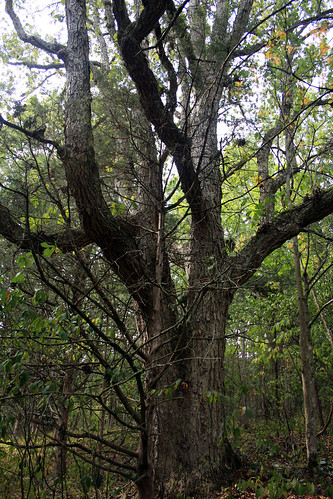
Stately forest elder.
(*photo credit)
March 21, 2022 Observing World Forestry Day
Man is weaned of the forest, and yet the forest is very
much a part of us. Sir Frank Fraser Darling
We could have titled today's reflection "Celebrate World Forestry Day," but there is not too much to celebrate when we observe how much of the world's diverse rainforest is being destroyed each year. One pessimistic environmental writer considers up to 200,000 acres are destroyed each day -- an incredible amount. Not all is lost, for Kentucky went from 20% forest cover a century ago to 50% today through halting and reforesting of marginal farmland.
We are aware that there are poor forest-cutting and management practices, and a failure to return logged lands to a healthy productive state. We could take stats from the Arbor Day people and recall how many trees are planted each year as a counter measure to the damage being done -- but are billions enough? Our forests can be productive when furnishing enjoyment to sightseers and visitors. Recall that the U.S. Forest Service is part of the Agriculture Department. The Department of Interior could focus "productivity" as recreational potential? Let's engage with trees:
1. Visit a forest at the beginning of spring. Life is only starting to stir and such a visit before foliage comes allows us to see the shape of trees and the abundance of life harbored in the understory. My church is next door to the Daniel Boone National Forest. However, it may be more difficult for you; if a grove or park is nearby, make a visit.
2. Plant a tree with all the attention given to species that is best suited, and the location and sun-space needed. The sapling may need some protective material from wild or domestic life that may snipe its leaves or chew its bark. Consider how this tree will ultimately fit into a surviving future ecosystem. Water saplings in dry times.
3. Read about a particular forest and how much it is threatened or able to be preserved with better care. A former Ecuador President Correa had offered to leave untouched an estimated 850 million barrels of oil inside Yasuni's ITT forest block in return for $3.6 billion from the rest of the world. A second suggestion is to visit the FAO Corporate Document Repository on the Internet to obtain reference learning materials.
4. Consider forest benefits and influence a classroom's students and teachers to regard the many benefits as worthy essays.
5. Contact your congressional representative to emphasize the need for funding for our national forest protection and programs.
Springtime Prayer: Uplift our spirits, O God. Cleanse us from the musty conditions of winter; raise up our spirits so as to undertake the renewal that is utterly needed today. Winter is ending and spring alerts our sense of refreshment and harkens to our renewed energies. Let me open my eyes to the daffodils, dandelions and crocuses. Lent continues to make its inevitable course. Rouse us Lord! Instill in us a new beginning, a new fire. Gladden us with a sense of achieving success with hands, head and heart. Multiply blooming flowers and singing birds of the season; may all lively creatures awaken our tired hearts to proclaim new life as we prepare for the resurrection soon to come.

Glacial melt in British Columbia.
(*photo credit)
March 22, 2022 Melting of the Arctic Sheet
On World Water Day we are well aware that the reserve ice of the polar regions and the glaciers is melting at a quickening rate. Specifically, we are told things I would have never believed I would live to see -- the rapid disappearance of summer ice cover of the fragile Arctic region and the loss of valuable glaciers all over this planet. In the past decade the Northwest Passage has truly become a reality for shortening the travel time to Asia from Europe and Eastern U.S. -- and in one way this is a commercial blessing -- virtually the only positive aspect of global warming.
The National Oceanic Atmospheric Administration (NOAA) reports each year of the melting of the Greenland ice sheet, along with record summer sea ice loss that is making life very difficult for polar bears which use ice to find food. The agency says that this melting involves both predictable and unpredictable happenings in a very sensitive portion of our planet. The predictable was that this would happen; the unpredictable is that it would occur so rapidly and irreversibly, for NOAA says that it is highly unlikely that the former ice sheet of the last century will return. Why is this of significance beyond allowing cheaper transporting of goods among Asians, Europeans, and North Americans?
* Ice is melting in the Arctic and other parts of the world. Among the findings from the data collected is that sea ice extent fell to a new record-keeping low last September. Furthermore, the Greenland nearly ice sheet-wide event occurs in July and all (97% of the surface) is affected. The immense melt is raising the levels of our oceans.
* Tundra vegetative growth is greener and the summer growing season is extending throughout the region. This weather change is being observed in many other parts of the world as well. What does this mean for weather sensitive flora and fauna?
* Weather extremities cannot be fully ascribed on an individual basis to a climate change cause and effect connection. However, good reason exists to believe climate change spawns severe cold weather in winter, record-breaking heat in summer, crippling droughts over vast areas and costly hurricanes when they strike a specific region. We cannot dismiss the growing costs of these disasters following one after another. In some years America's environmental bill exceeds one-hundred billion dollars.
Additional major problems involve sea and land ice and snow cover loss resulting in diminishment of highly reflective planetary surface, and this in turn will have a self-reinforcing warming effect. The more ice cover that is lost, the faster the warming. Furthermore, as the warming occurs, methane from melting permafrost layers in Arctic regions is released in ever greater amounts. We know that this methane has about two dozen times the greenhouse potency as does the worrisome carbon dioxide emissions.
Grace of Activism: Holy Spirit, move us to overcome complacency and act as proper citizens to help enhance our wounded Earth and improve the lot of our neighbors, especially those who are destitute or have limited income. Give us the sensitivity to see social injustice and be willing and able to do something about it. Help us avoid denial of problems, excuse as to acting and escape when we see some problems to be more than what we can handle individually. Direct us to work with others. Make us sincere activists like Christ.
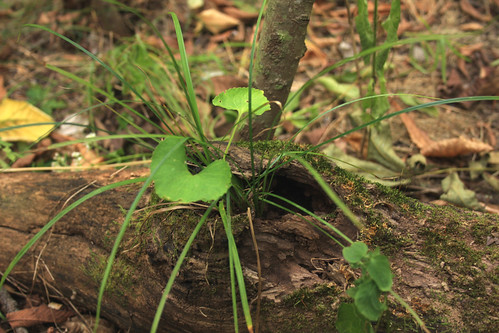
Nature's ikebana (Japanese art of floral arranging).
(*photo credit)
March 23, 2022 Saying a Brief Prayer at the Reflection's End
Some have suggested that these reflections either contain a full-length prayer, or leave the prayerful last sentence off entirely, for most reflections are on secular environmental, homesteading, or other public interest issues. Recall that prayers simply do not have to be long; the Our Father fits the brief category (Luke's version in Chapter 11 is briefer than Matthew's in his Chapter 6). Since God already knows what we are asking, it is the sincerity of our prayers that count, not length of explanation to the Lord. For us, to conclude so abruptly in prayer is meant to indicate that our conversation with the Lord is ongoing, and thus we include the divine throughout a seemingly secular reflection.
Subject matter. I regard all matters related to healing the Earth to be serious and worthy of a prayerful conclusion. Our daily lives include matters of concern to which we seek the Lord's help. Variety in subjects, even when on a secular subject, sharpens our minds and makes us open to new opportunities that may arise. We gain in creativity when we learn about and reflect upon a host of daily happenings needing divine assistance.
Reflections ending in prayer. We are called to pray always and include the human and divine in everyday life. Certainly, not all "prayers" are said mindfully; some are highly routine and have their own place, but each reflection here with one line titles is meant to be unique for that day. The important issue is that we ought to be creative in the way we pray and thus reduce the temptation to be routine. Part of our ministry is to bring people to prayer, for it goes hand-in-hand with Earthhealing.
Ultimate purpose. My fellow Jesuit and environmentalist, John Surette, told in his Christmas message of the three workers who were asked what they were doing; the first said carrying stones; the second, making a livelihood for his family, and the third said "building a cathedral." The purpose in these reflections go beyond the subject matter for reflection HERE and that is worthy of reflection for a variety of reasons. It is more than what I am moved to do in my older age when my mobility is impaired and limited to making a living by writing NOW.
A third and deeper level of purpose is to go to the heart of cooperative efforts and involve WE. The cathedral we are building is a healed Earth, a place where people can live a higher quality of life. All of us must work together in whatever way possible to bring about changes needed to heal our troubled Earth. The public needs to be alerted and learn to accept the threats as something they can address with others. However, this democratic task is not easy. We need divine help to sustain our creativity and enthusiasm. To stay on the steady course requires moments of public prayerfulness -- and so we end this reflection as such.
Compassion Prayer: Lord Jesus, you always show compassion for those who suffer in this world. Help us in this Lenten time to strengthen our sense of compassion for others, especially those who suffer in our midst. This is a most human form of resonance with others and enhances our sensitivity and love for our neighbor. May we continue to show compassion for the damaged Earth and for all its threatened creatures as well. Never let us lose the proximity to your love and mercy -- and compassion.
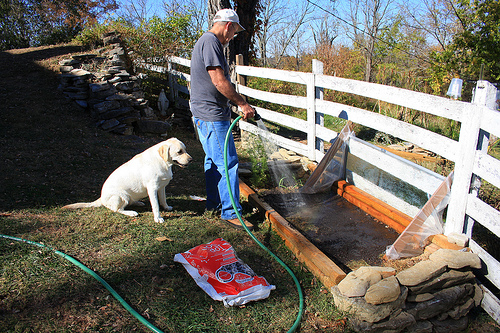
Work to nurture plants in a cold frame.
(*photo credit)
March 24, 2022 Preparing a Seasonal Garden Salad
At the start of each new season of the year I attempt to make a twelve-part salad using most or all materials from my garden. It is a good opportunity to do so on even when gardening becomes a challenge in early spring. Having the magic number "twelve"-part garden salad takes imagination. Sometimes I add an ingredient from a neighbor's or parishioner's garden that can highlight the season; in rare cases I use preserved produce that came in earlier cultivation.
This is first drafted about three months before the crops are grown and harvested for the 12-part spring salad. The listing has been updated depending on the foibles of the 2021-22 winter.
* turnip tops -- they grow when sheltered through winter provided the season is warm enough.
* kale leaves -- a hearty and highly nutritious brassica that ought to be grown whenever possible.
* mustard greens -- I like to put this variety as a border to my garden to ward off the rabbits.
* chickweed foliage -- good in winter to spring but not available by mid-spring due to seeding.
* garlic spears -- this winter garlic is really best at this time of year.
* carrot roots -- a holdover from last summer provided the varmints do not find them first.
* dandelion "mess" -- yes, under the leaves are some fresh dandelions for the picking.
* polk salad -- if the leaves are already up depending on late winter weather.
* endive clumps -- a green that endures the winter cold better than most and is quick to grow again.
* collards -- what more can be said but this is really a mainstay for the year-round garden?
* oregano buds -- the first leaves will be well received as for herbal flavoring.
* mint leaves -- I have six varieties and one or other will have enough leaves at this early time, especially the hearty chocolate and apple.
Other possibilities: In addition, in some years I grow parsley indoors and that can be an added treat, for it keeps the mind alert and deserves a sprig a day for people of all ages. At other times I have some arugula, onions, radishes, and other wintered-over greens that are worth considering. The field is not exhaustive and that is why the number 12 is well worth aiming for by gardeners who do not want to tire on certain veggies. The garden salad mixture can be in various types and amounts and then there is the dressing that will give the extra flavor needed for the occasion.
Incarnation Prayer: Jesus, you are God/man, divinity/ humanity. We are caught up in the emergence of this mystery in our own life. If we imitate you and through Baptism are members of your Body, then the interaction of divinity and humanity must show in our actions, as it does in yours. We are to suffer with you and do so with divine love. We are to see that all efforts have natural settings and conditions and yet have eternal and divine goals. Our human acts must also have the touch of the divine, as well as the thoroughness of being human. May we also show the touch of divinity in which we were blessed at Baptism.
Trusting in God
It seems such a simple thing to do, but do we do so? How often do we utter in prayer that “We trust you, Lord.” As we move through Lent and the struggle of everyone to broaden and strengthen faith, we are aware of the very gift that is offered to acknowledge the divine working in the world around us. Before we forget it, we Americans ought to recall that our national motto is “In God we trust.” Some secular fellow citizens would like to see this motto dismissed, and still others after the pandemic we have endured would like a reaffirmation. God is over us and divine providence surrounds us; we have experienced a reduction in social contact, the bother of mask-wearing and the avoidance of assembled people. The pandemic has taken its toll even beyond those who suffered from the virus.
In these serious times, the utterance of trust is all the more crucial. Drug overdoses and suicides have increased since the beginning of 2020, and an optimistic spirit has come on harder times. Yes, it is difficult to keep a sense of balance when so much seems to be going against us. This is all the more reason for us to turn to God in prayer and show our complete trust that things will work out in the long-term for the better. We trust that God can assist in ways we do not imagine at this time.
Our reaffirmation of trust in this season of Lent and prior to the Holy Week suffering and death of Christ is part of our annual faith experience. We reach a time in our lives when threats and possible difficulties crop up; we simply fall back on our awareness that we are not master of times, only God is. What the difficulties of health, economics and environment present us is our inability to act alone. We need divine assistance or we cannot succeed.
You might say, “tell us a new insight.” This is not always the best procedure. I recall the late Archbishop Tutu who said his simple and repeated message was that God loves each and everyone, with no omissions. He repeated this over and over because it was so essential for all his faithful to hear. This message of trust bears that simplicity, for God hears each and every one of us who give a lament of utter trust. “Lord, we affirm that you hear us; take care of us for we need your companionship during these times.” Certainly, springtime opens itself to new happenings and new life; we cannot forget that God wants us to be close, and so the national motto becomes a chorus of all who are faithful. We are confident – and that means trust – that things will soon improve. New life is coming and the Easter resurrection is a reality looming before us. New life gives us a surge of hope. “In God we trust.”

Tender wild greens make tasty fresh
salad.
(*photo
credit)
March 25, 2022 Speaking and Writing Faithfully: Word Power
On the feast of the Incarnation, we consider Word eternally spoken to a world in need. This raises deeper questions: Are these reflections the ranting of an elder or do they give some hope of survival beyond my passing? They are not written in stone, but are included in a "flash drive" that may or may not survive the rapid changes of communications devices. Do words get planted in other hearts through charismatic tones or powerful word-smithing, or seep in the most subtle ways? Do they have an audience that cares enough to remember just one or two ideas? Maybe there is some power in every word spoken or written.
Does our faith come to play here? Written reflections involve words seeking to trigger or actualize deeds. They must be more than mumbles and stumbles, of things well or poorly said. They must be said with conviction that something will occur to give them lasting value. Can speakers put zing in their speech or zip in their words? The challenges face all of us: does our communication have lasting value either for the speaker or the hearer? To effect change, the words need to be believed both by the speaker and the hearer. I can fool myself and say it is the fault of the recipient. I can philosophize that this will last until the next Twitter feed or Facebook image. Certain giving and receiving is a two-way street and requires both parties, but is this frequent?
Do I believe in the power of words even after writing a great number? Perhaps, there are levels of belief on our journey of faith with the horizon getting closer with time. Does it really matter as we get closer to judgment? The power of any words we say is not really ours to judge; let's do our best and hope for results. To doubt a lasting power is to weaken the power of the words. If I truly believe that I am empowered by the Incarnate Word within me, then these words have a power not from me, but transcending power of God working within me. The firm belief in this spiritual power gives it enhanced life.
Words give direction, focus on issues, refute harbingers of doubt, and encourage citizen participation. However, sounding alarms, calling for prompt action, discussing benefits by joining others is effective. Words bring change when willingly received by believing people; these give living proof that words can become incendiary; delivery styles excite emotions; anger spills into uncontrolled violence. We need to believe that words spoken with power can inflame a world for the better; these can bring about new life. If the magnifying power is of divine origin AND the one uttering truly believes, then words are offered to those empowered to join forces for good. I must believe that these words can move others -- and will. It is not false humility, but rather a request through prayer to become effective through the Spirit.
Annunciation Prayer: Lord God, you broke into human history with a fulfilling promise of a Messiah. The word comes to a simple maiden who answers in a "fiat" affirmative, what in contrast our first parent Eve so plainly negated. Freedom fully flowers in a "yes" to a magnificent gift of divine love. Allow us to show our gratitude that the Incarnation Mystery will become a part of our lives in the Body of Christ. May our human actions have a divine bearing in your name.

Carduus nuttans, European introduced species,
now invasive exotic plant.
(*photo
credit)
March 26, 2022 Earthhealing Practice and Realism
We are constantly faced with reality, and that means we are to be balanced and not overly pessimistic or optimistic on our ecological viewpoints. Along with others concerned about environment I have vacillated in one or other direction. When we try to arouse a tepid audience an apocalyptic or harder approach seems most appropriate (See Reclaiming the Commons Chapter Six). This creates an alarm, which many flee through denial, excuse, or escape. On the other hand, a soft approach that involves optimism may say the matter will be handled by experts and market place, and I do not have to worry about climate change. Thom Hartmann in The Last Hours of Ancient Sunlight launches into a list of startling statistics in his book's introduction. Not a rosy picture! The opposite picture is painted in Rand McNally's America: A Celebration of the United States with flawless and incredibly beautiful scenic photography. Neither approach works perfectly; neither approach tells the whole story.
Realism is always a better approach, for it builds ultimate confidence of success even when it is possible after our lifetime. Realism is good spirituality, for it follows that of Jesus and his mother Mary; both really saw what stood ahead of them and still followed the will of God in all things, not pretending that the world was in better or a permanently crippled condition. Realism is seeing things exactly as they are, not too rosy or too confused. Realism is accepting the knocks that come to us and knowing that no matter how bitter they seem at this moment, God will show us the way through to ultimate success.
This website mixes reflections that can be regarded as light and airy with those somewhat darker. I find that working in a garden is the best approach when indoors conditions become too oppressive. Our Daily Reflections are really a mix of a hard and soft approach, but telling others that best is to see all sides on an issue. A prophet says that failure will come unless ...; another prophetic witness will say that success will come, if we do more of this or that. The realist will tell what must be done or avoided and not try to predict the future, because it will most likely not be what is foretold. The key is balancing what is with what could be, if all works well. Contrary to our hint in a reflection of five years ago, it is not a mixture of optimism and pessimism, but rising above them when both elements are present.
We fight the fight with confidence that in the power of word translated into deed a good result will most certainly follow, and our Earth can be healed. Will it inevitably happen? We do not know, for our only realistic certitude is that we must continue the struggle. To suggest dire circumstances, if we do not may be an imperfect approach, for it is our love to do what is right that drives us forward, regardless of the outcome.
Angelus: The Angel of the Lord declared unto Mary,
and she was conceived by the Holy Spirit. Hail Mary...
Behold the handmaid of the Lord.
Be it done to me according to your word. Hail Mary…
And the Word was made flesh.
And dwelt among us. Hail Mary...
Pray for us, O Holy Mother of God,
That we may be worthy of the promises of Christ.
Let us pray. Pour forth, we beseech you, O Lord, your grace into our hearts, that we to whom the incarnation of Christ, your Son, was made known by the message of an angel, may by His Passion and Cross, be brought to the glory of His Resurrection. Through the same Christ our Lord. Amen.

Reflections in a garden pond.
(*photo
credit)
March 27, 2022 Celebrating the Blind Man's Courage
He replied I told you once but you wouldn't listen. Why do you want to hear it all over again? Do you want to become his disciples too? (John 9:27)
In the middle of our Lenten forty days, we pause from the austerity and allow a celebration to occur when we rejoice (Laetare Sunday). The stories of courage among Christians allow this joy to be expressed, for their presence allows the entire believing community to rejoice, as does today's story of the blind man coming to faith. There are still people in this world who will not give deference to the wrong persons, but will speak with courage as well as faith -- for both virtues are closely bound. Recall that even the parents of this nameless blind man forsake him for fear of authorities and make him speak on his own.
No passage in Scripture had a greater impact on my early journey of faith than this Chapter Nine of St. John's Gospel. As I say elsewhere, what an honest and brave person! He risked and was thrown out of the synagogue, a protected religious institution in Roman times. Now his life was at risk in following Jesus; certainly this was life-threatening in this period in history, for he had no legal protection and could only live with courage.
Solitary witnesses have existed down through history. Such people as the young French maiden Joan of Arc, the Second World War Austrian Franz Jagerstaetter, and Henry VIII's chancellor, Thomas More, or even the Roman saints we introduced on March 7th, Perpetua and Felicity. These were people who lived in very different times and under widely varied circumstances, but all were martyrs because they stood firmly for what they believed and gave their lives for doing so. Like the man born blind, they each affirmed that the Spirit was moving them, and each in a quiet courageous manner showed that the power of the state did not crush their own spirit.
The condition of blindness, as Jesus says, is not due to an individual or his parents. The person is set apart so that the works of God may be shown through him. We see in the healing act of Christ the divine mercy at work here; this triggers gratitude on the part of the blind person who responds now in his frankness. Even before the first martyr Stephen, immediately after Pentecost, this blind man refused to be overcome by being thrown out of the synagogue. Thus, he was beyond the pale of protection in being part of a tolerated and protected approved religion in the powerful Roman Empire. He was to be the first follower of Christ to resist the pressure of the state to conform, and he was aware that he was eligible to become bait for the lions.
Grace for Profession of Faith: Lord Jesus, we are amazed at the story of the blind man who you cure. He professes his faith in you, even when at the risk of and actually being thrown out of the Jewish faith community; he is now subject to Rome's lions' lunch. You observe his parents failing to back him when under questioning by the critics. On the other hand, solely on his own, the cured blind man acknowledges you. May we be so bold in following his example and publicly profess our faith in you. Be our companion and model during these troubling times.
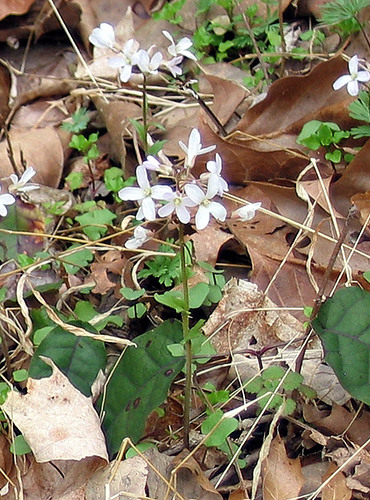
Cardamine douglassii, purple cress.
(*photo credit)
March 28, 2022 Taking Electricity for Granted
When storms strike as it did in Texas and elsewhere in February 2021 and lights go out over vast regions, economic and social life comes to a standstill. We often forget that utility-generated electricity, that essential to modern life, was not even present in the mid-1800s. In fact, in my infant years, our new house built during the Great Depression was wired for electricity, but my folks could not afford a utility hook-up. Instead, we had kerosene lamps, coal-fired cooking stove, cistern water pumped by hand, clothes hand-washing and line-dried, and an ice box for refrigeration. Housework was certainly more burdensome.
The electric system that we know is like an umbilical cord; without it, immobility sets in from street lighting to computerized businesses; gas pumps do not work and heating and cooling systems shut down. It takes fuel to keep things operating, and yet the world seems to be depending way to long on fossil fuels as a transitional fuel before carbon-free renewables at mid-century. Today the mix of fuels used to allow American utilities to hum is in great flux. Costly and dangerous nuclear power has plateaued; dirty coal is in sharp decline (from 42% thirty years ago to less than half today); fracked natural gas is an export commodity. Renewable sources, though handicapped for too long by lacking a fair playing field, are making their presence felt but too slowly.
During this decade renewables are paying off, with a majority of all new domestic electrical generating capacity installed is renewable (mainly wind and solar). The Federal Energy Regulatory Commission's Office of Energy Projects announced at the start of 2022 that in the previous twelve months wind was the primary new source, with solar close behind. We have also seen a rise in interest in geothermal sources that are not intermittent as are solar and wind, and have a potential to become a major contributor by mid-century. New renewable energy sources now account for over one-fifth of total installed U.S. generating capacity (a sizeable annual component of this is currently hydro).
Renewable-fuel-generated electricity is arriving rapidly, but with only a fraction of what was once a half-trillion dollar a year in fossil fuel tax incentives and perks. In fact, while governmental incentives are needed, still the market-driven advances with solar and wind as competitive sources cannot be discounted. However, the rise of low-cost fracked natural gas stands as a new and unexpected hurdle for going to a total renewable energy economy by 2050. So-called "clean" natural gas is really dirty, when all costs from extraction and production are totaled. Besides placing strict regulations on fracking, two actions must be taken simultaneously: giving incentives for renewable energy utilization in electric production, and enhancing the national electricity grid network.
Prayer for Forgiveness: Lord merciful God, hear our Lenten prayer asking forgiveness for the many times we have offended you. We ask in a special way at the start of each Mass and seek to be ever more intensely mindful during this season. We reaffirm that you forgive us, though it is even harder for us to forgive ourselves, for what we had done to you, to other people, and to the welfare of Earth herself. Keep us mindful and yet not paralyzed by guilt; prompt us to gratitude for your forgiveness though service to our neighbor.
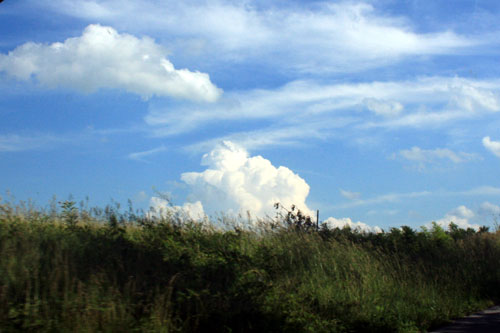
Cloud on the horizon. Washington Co.,
KY.
(*photo
credit)
March 29, 2022 Encouraging Local Voluntary Hospital Chaplains
This year our local hospital lists the names of volunteer chaplains and their schedules. I am no longer able due to mobility difficulties, but realize that the mustering of resources are getting more difficult; it is not easy work. For one, a visiting chaplain has no idea what problems the next room will bring. It may be someone who desires to talk and join in prayer, or it may be someone who wants no part of this ministry. Being refused is hard on someone offering voluntary service -- and perhaps on professionals as well. However, a time of joy is when the ill person really wants someone to sit, talk and pray.
The volunteer chaplain has to be sensitive to the people, for one does not want to appear prying even by a simple remark. The common salutation, "How are you?" would bring a response such as "If fine, I wouldn't be here." The sharp response when not expected can be answered with a laugh or smile, and all too often that can be the starter of a quick but honest chat. I have been reminded at this small hospital with no permanent chaplain that I lack the professionalism of permanent religious staff -- but that is the price of being small town and poor. I trust the Lord helps us make up for what we have failed in bedside finesse.
One challenge of the hospital visit is to size the situation quickly. Must one identify themselves and make a quick offer of prayer and move on, or should they show a willingness to linger and extend the visit? This is not easy to determine quickly. If the ill person has visitors their welcoming or rejecting mode tells me much about length of stay. Quite often visitors have been there at the loved one's bedside for an extended length of time, and they desire a visit from someone other than a health professional.
The volunteer has to be open to learn something new from every visit. If being quite sensitive, this is done as much in gesture and facial expression as in word. One quickly learns that people approach their own ailments in vastly different ways, and that the light-hearted are generally more able to recover. On occasion, the ill is on his or her way to eternity, and this becomes an opportunity to pray with family members, who are suffering with the possible loss. At such times the chaplain's presence can be deeply appreciated. That final dying moment is a unique time, and company may be highly welcome.
Here in Appalachia, most of the ill are Christian, whether church attendees or not. However, few have a basic concept of offering their sufferings with the Lord on Calvary, for that was an event of long ago for them, so why bring that up? Mentioning the presence of Christ here has some meaning without necessarily relating his presence to Calvary, except among Christians who realize the glory of the cross; this can be a moment of grace.
Making Love? Lord God, you are love; we need to affirm its basic uncreated nature. We are limited in English to only one word for "love" with several different meanings, of which favored growth in sexual attachment for another is one. So is psychological and intellectual attraction. Lord, keep us on the track to see that all the love we have is built on connection with you, for true love is given and received in the manner of the divine personal relationships. Help us see love as an ocean of which we are immersed, and only our openness can be broadened by human effort. Through your divine grace may we become ever more loving persons.
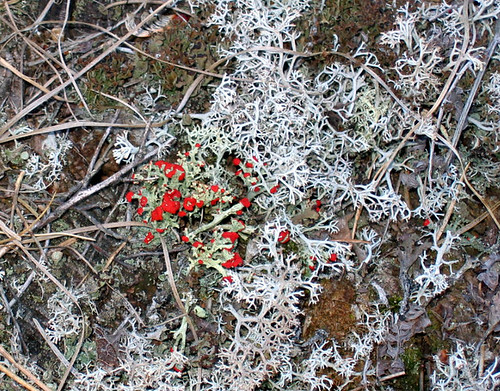
Cladonia cristatella, British soldier lichen. St. Ignace, MI.
(*photo credit)
March 30, 2022 Making a First Impression a Lasting One?
Whoever takes pride in saying that one's first impression lasts throughout life may be questioned and challenged. Why should it? Is this the moment of deciding likes or dislikes? Some may pride themselves in the quick determination, but what does it do to improving relationships over time? Rather, let's ask ourselves six basic questions:
Is rapid impression a mark of our immaturity or rash judgment?
Do we take pride in coming to quick decisions that really call for much more information? Maybe it is best to forget first impressions and concentrate on going slower in everything, especially judging the qualities of other people.
Are our impressions skin deep? Many times people have a distracting condition, whether facial, their teeth, their gait, hair style, their voice, or other things that immediately draws attention. That first impression says virtually nothing about the person as such. Can we avoid allowing these first impressions from interfering in our ensuing conversation and relationship?
Doesn't our attitude affect people we meet? Some people with noticeable characteristics, which they know are noticeable in company or in quick response situations, are not fully able to present themselves well. Does this allow us to say our first impression is true? Isn't it partly our fault through an attitude that the person realizes very quickly makes them vulnerable to quick judgment?
Are we overly opinionated? If first impressions are lasting, then maybe we ought not make an initial impression and reserve judgment until later or never make one. How are we so sure that we can cast a judgment on an individual in a single second, especially if we are distracted, depressed, or even unwilling to open ourselves totally to the other? Our attitude must be weighed in the current culture of glib and brief encounters.
Why allow impressions to dominate our outlooks? We may want to hear the person through and immediate impressions may be the sign that we come to judgments too quickly and are poor listeners. Involved in the rapid impression is admission that we are not deep in the way we come to relationships, or that we have too high an opinion of our own quick responses.
Are we not willing to change impressions? The terrible impression that a young Abe Lincoln made on the successful trial lawyer Stanton did not hinder Lincoln from appointing him to his cabinet. Over time, the relationship of the two progressed to deep mutual respect and that first Stanton impression proved false.
Grace to Trust in God: Lord Jesus, you taught the disciples over and over to be ever more open to trust in God. Help us see that this trust applies to each citizen of the planet at this time when we are called to collaborate in a global manner never before undertaken. May we be ever trustful, especially as we launch into greater activism in order to renew our troubled Earth. America's national motto is "In God we trust;" so often we are forgetful of what this really means. A small child has trust in parent; may we grow in trust of our Abba Father.
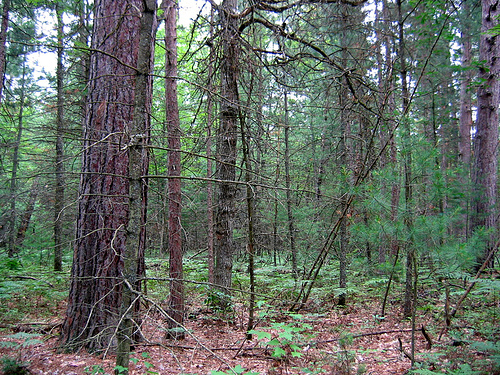
Red Pine Natural Area, Roscommon Michigan, old growth.
(*photo credit)
March 31, 2022 Affirming a Possible 2030 Renewable Energy Economy
Many things are "possible," if we put our mind and heart to it. The sooner we get to a renewable energy economy, the better we can assure that climate change catastrophe can be avoided by mid-century. The Trump climate-denying Administration has proved costly in time, even while many states and local governments as well as other progressive national economies have been making sizeable headways, though not as fast as originally expected.
In 2012, one study by the University of Delaware said that renewable energy sources could meet 99% of U.S. Electrical demand by 2030. It was expected that projected wind and solar in 2030 at about half of today's wind and solar costs, whereas maintenance costs would be approximately the same. The truth is that the reductions of solar and wind costs are meeting projected time tables. Another study in early 2011 by the World Wildlife Foundation International set a goal of 95% renewable energy by the year 2050; the assumption was that in 2050, total energy demand could be 15% lower than in 2005, but that may have been too optimistic. The expectation was that heating needs of buildings could be cut by 60% through energy efficiency and use of solar power and geothermal heat. Suggestions included upgrading electricity grids, installing smart grids, halving meat use, and expanded public transportation are all possible savings.
Renewable energy sources are now receiving support from U.S. federal agencies; market forces are making renewable viable to a far greater degree than a few years ago. Renewable energy sources, coupled with energy conservation, soften or delay catastrophic climate-change conditions facing our planet from a century of excessive fossil fuel use. By utilizing safe and environmentally benign energy sources, pollution from extraction, processing, conversion to electricity, combustion, or disposal of waste materials could be reduced and eventually eliminated. Unfortunately, coal is still a transitional fuel.
Renewable energy sources may be tied into the entire energy grid through net-metering programs with traditional electricity-delivery systems. Large-scale, national "Apollo-type" (from U.S. space efforts) renewable energy programs should still be created in various advanced countries. New available solar products can be integrated into building roofs as well as off-shore wind farms. We can expect that geothermal energy has great potential, but drilling takes additional investment resources. Big Energy expends vast sums and its propaganda machinery to cast doubt on future climate-change projections. This group tries to imitate the highly successful tobacco corporations' history of casting doubt for decades on smoking as a cause of cancer and other health problems. Much depends on how fast the renewable energy transfer can occur, granting a major international effort.
Prayer to the Master Builder: Creator of the Universe, encourage us to improve the places where we reside, and to help furnish habitats for the homeless and refugee. Help us enter into the grand infrastructural undertaking that must include affordable housing for all who are in need. Quicken us to inspire others to provide their own basic housing needs by building their own structures, using their native materials, and completing public examples of which they can be truly proud. Let them demonstrate that what they achieve is done through your inspiration. And give us all the energy needed to renew and rebuild our troubled Earth. |